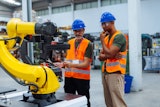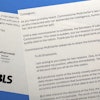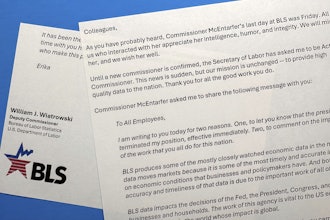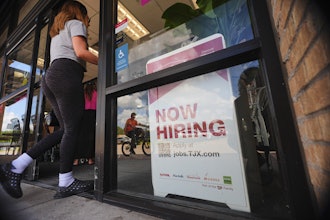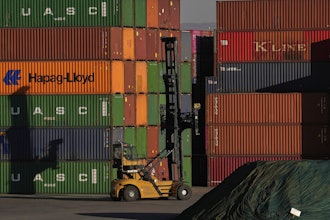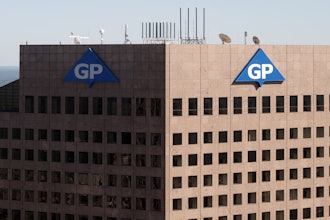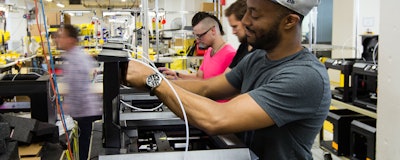
 Stevie Hay
Stevie HayMillennials now make up the largest proportion of the American workforce at over 53 million, and are projected to surpass the Baby Boomers as the largest generation. At the same time, the manufacturing industry saw an estimated 337,000 job openings in August 2016. Manufacturing accounted for 12 percent of the gross domestic product (GDP) of the US economy, and those workers earn an average of $26/hour. Over the next decade, nearly 3.5 million manufacturing jobs are likely to be needed, but 2 million are expected to go unfilled. This industry is not viewed as a desirable field by many millennials, due in part to misconceptions that manufacturing jobs are low paid and labor intensive. In reality, the majority of those unskilled tasks have been automated, and modern manufacturing relies on a highly skilled, technical workforce.
This generation has grown up with the internet, computers, and smartphones, and so they have greater expectations than Baby Boomers or even Gen X. They also have a different view of the workplace, with a greater emphasis on mobility and collaboration. Millennials expect advanced technology in the workplace, and manufacturing can attract young workers by emphasizing how much technology is used. Enterprise Resource Planning systems (ERP) provide immense value to an organization by improving operational efficiencies, reducing costs and facilitating growth. Traditional enterprise applications have concentrated on functionality, with limited regard for the needs of the end user. The rise of the millennials means ERP systems must advance to meet their expectations.
User Interface
In years past, fit and functionality were at the top of list when considering an ERP solution. The software required extensive training on navigation and workflows. Users adapted to the systems as best they could, and sometimes developed manual processes to work around it. Millennials are not likely to make the same compromises. Simple, accessible and intuitive consumer applications are expected. Ease of use has risen to become one of the top considerations for an ERP system. A user interface that provides specific priorities and procedures related to their role is necessary to engage the millennials. Dashboards that integrate ERP and other enterprise solutions, such as Warehouse Management (WMS) and Customer Relationship Management (CRM) Systems, as well as email, accounting and other analytics, increase productivity by allowing users to multi-task without opening and closing multiple applications.
Information should also be pushed out to the user via alerts and notifications, rather than pulled from system searches. Event management tools can be configured to continuously scan for specific events that arise, such as large orders from a top customer, or actions that fail to occur, such as missed maintenance on a key piece of equipment. Alerts can be delivered based on user preference, such as text, email or instant message, and escalating decision trees can be established to determine who is notified based on the type of occurrence. This insight can then be aggregated and analyzed to develop action plans for the next shift or the next planning cycle.
Mobility
Accessibility is another key consideration. Currently 74 percent of manufacturers use mobility solutions, and that number is expected to reach 98 percent by 2020. Millennials are accustomed to taking their tech with them, and they expect to have similar mobility in the workplace. This generation wants a flexible work schedule and telecommuting options. At the same time, such mobility has the potential for increased productivity because they are so connected. Real-time access to data at any time, anywhere, from any device can also improve operational efficiencies. A manufacturing operation is typically not limited to one site; the plant may be located in one state and operations may be housed in another. Mobile solutions allow for easy access to information wherever and whenever it is convenient. Inventory can be adjusted, financials can be analyzed and shipments can be monitored regardless of where the user is located.
Besides mobility, millennials also want access to their own devices. The line between personal use and business use is blurring. As a result, BYOD, or Bring Your Own Device, is a growing trend across many industries; in fact, 63 percent of manufacturing companies allow BYOD. Implementing such a policy can increase operational effectiveness and user productivity throughout the entire organization. At the same time, BYOD raises a number of concerns and challenges, including safety and security risks. Determining the best way to integrate ERP solutions with BYOD will be one of the greatest challenges for an organization’s IT department.
Communication and Collaboration
Another trait of the Millennial generation is the need to communicate and collaborate. ERP systems allow Baby Boomers, who have been working in the industry for decades, to share their knowledge, while at the same time providing Millennials with best practices and critical insight for reference and training. The challenge for Millennials coming into an organization then becomes where to look. Information is often scattered across a number of systems. Incorporating an enterprise search capabilities allow users to find information just as they would outside the shop floor — “Google” it. Auto-suggest can recommend terms based on incomplete user input, while relevancy scores can rank results. Private social networks such as Yammer allow for instantaneous communications, and chat records can be attached to ERP records. Millennials also thrive on constant feedback. Business Intelligence software would empower employees personalized Key Performance Indicators (KPIs) in real-time, and allow them to create and share custom reports with self-service tools.
Conclusion
In order to attract this next generation of workers, manufacturing must change their perception of the industry. Robust ERP solutions are the way of modern manufacturing, not only to advance business operations, but also to bring in the Millennials. Millennials are accustomed to using high tech devices, and manufacturing must demonstrate that technology is an integral part of this industry.
Stevie Hay is director of Axis & AssetPoint at Aptean.
